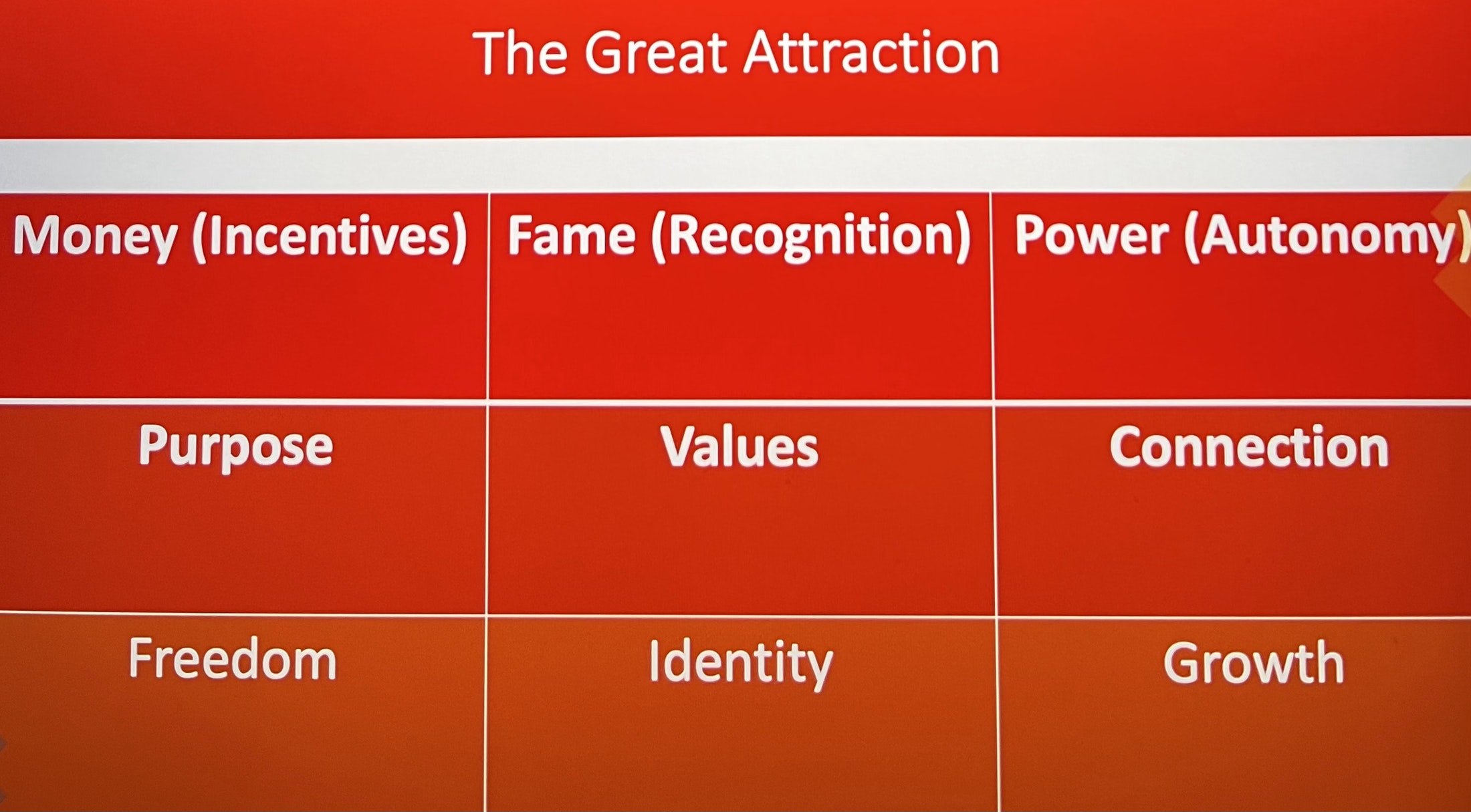The Age of the Seasoned.
While society, politicians, and businesses of every kind (particularly marketing) are focused on what comes Next, on the New, On the Young, and On the Emerging, the biggest shift and impact on us all may not be what will come but those who have come before!
Yes, Millennial and Gen Z are critical because their habits and behaviors and expected longevity, but we may be entering “The Age of the Seasoned”!
There will be more seasoned people with 25% of the Europe and US population being over 65 by 2050.
They will control 70 to 75 percent of the wealth.
Companies will be desperate for workers with experience as workforces shrink.
The fight against Sexism and Racism may in time extend to Ageism.
Flexible work and new technology behaviors due to Covid will create massive new flexibility and opportunity for the seasoned.
By 2050, one in four persons living in Europe and Northern America could be aged 65 or over.
According to data from World Population Prospects: the 2019 Revision, by 2050, one in six people in the world will be over age 65 (16%), up from one in 11 in 2019 (9%). By 2050, one in four persons living in Europe and Northern America could be aged 65 or over. In 2018, for the first time in history, persons aged 65 or above outnumbered children under five years of age globally. The number of persons aged 80 years or over is projected to triple, from 143 million in 2019 to 426 million in 2050.
Older people tend to be more active politically and vote more often so they will have significant heft in democracies.
People over 55 now control nearly 3 of every 4 dollars and the share is growing.
Though the generational picture is stark, the difference in U.S. household wealth by age makes the picture of shifting wealth even clearer.
Until 2001, the shares of household wealth held by different age groups were relatively stable. People aged 40-54 and 55-69 held around 35% each of household wealth, retirees aged 70+ hovered around 20%, and younger people aged under 40 held around 10%.
Since that time, however, the shift in wealth to older generations is clear. The 70+ age group has seen their share of wealth increase to 26%, while the share held by ages 55-69 has grown from 35% to almost half.
But not all ages are seeing an increasing slice of wealth. The 40-54 age group saw its share drop sharply from 36% to 22% between 2001 and 2016 before starting to recover towards the end of the decade, while the youngest cohort now hover around just 5%.
Clearly within the older generations there is wide disparity in wealth with tens of millions not having enough to retire and others with enormous fortunes, but as a cohort the Seasoned is where the money is.
As populations begin to shrink and assuming anti-immigration fervor does not dissipate businesses will increasingly have to rely on older employees.
Population in most Western countries is shrinking fast and the recent Census revealed that the US population growth this past decade
The United Nations has said the number of people in the EU bloc will drop to 365 million by 2100, down from 446 million today.
But a new study, published in the medical journal The Lancet, predicts it will fall more sharply, to 308 million by the end of the century.
The year 2021 is the first time since 1937 that the U.S. population grew by fewer than one million people, featuring the lowest numeric growth since at least 1900, when the Census Bureau began annual population estimates.
Both for financial reasons of countries delaying pensions due to financial constraints and the desperate need for workers there is going to be a massive aging of the workforce.
Increasing Sensitivity and Awareness of the Other “Ism”: Ageism
Recently a research report titled “Workplace Equality for All! (Unless They’re Old)” conducted by professors at Stanford and New York University revealed that while there was less and less tolerance for any form of racism or sexism, ageism was still relatively widespread.
Their research revealed that more people tended to endorse this idea that there should be equality for everyone and striving to reduce prejudice toward traditionally discriminated groups, there was this surprising correlation. Those who were more egalitarian — who were striving to reduce prejudice toward traditionally discriminated groups — were less likely to endure racist views and less likely to endorse sexist views but weirdly, they were more likely to support ageist views, endorsing this idea of succession; that older adult should step aside and make way for younger generations
However, it is very likely that the advances against racism and sexism will likely also help against ageism because the concept of “fit” which might have held back women and people of color can also no longer be used to discriminate against older people. As the authors note:
“Think of how many hiring decisions, firing decisions, promotions, raises and opportunities are allocated based on so-called 'fit.' Man, the word 'fit' is so loaded when it comes to age, right? It's a code word.”
As a result, more and more companies are facing and losing age discrimination cases.
How Covid changed mindsets in ways that may benefit the Seasoned.
Millions of Americans have disappeared from the workforce, and many of those who have left are older. Their exit has many causes from positive ones such as appreciation of assets that allow them to leave to negative ones which are greater susceptibility to illness or in ability to get back easily to a job. This has left business scrambling for talent and more willing to increase pay, provide greater flexibility and better hours.
The two biggest shifts due to Covid which will benefit the more seasoned is that fact of distributed work (“remote” is not correct since being out of the office does not mean you are isolated and do not meet with people in other places) and how quickly older people began to leverage and adapt to technology putting a nail in the “they fear technology” nonsense.
Distributed work allows companies to buy a part of a seasoned person’s time making them affordable while giving them flexibility to go from full time to part time work and no longer a forced choice of work or no work. Technology especially with Web 3.0 will continue to enable and extend capabilities without knowing to code or be physically in great shape.
Finally, this supposed hunger for mentoring, guidance and learning the ropes that people are missing comes from whom? The Seasoned! And it can be done in person outside the office or even on Zoom!
Implications to Ponder.
Will generational divides be another axis of polarization?
Will the disparate wealth between the Seasoned and Gen X/Millennials be another driver of polarization or will the transfer of wealth via inheritance (though likely to increase inequality) ameliorate these possible fissures? The implications regarding the future of taxes, medical care, and social benefits are likely to be significant. Already young people are far more likely to be socialist as they wonder if they will ever do as well as the older generations with many ladders of advancement and wealth creation in short supply.
Is your firm getting ready for the Age of the Seasoned?
Every company should not just ask how they are getting ready for not just for the next frontiers of technology but the Tsunami of the Seasoned.
From introducing or adapting products to designing services it will be key to keep this key constituency in mind. HR and Talent management needs to ensure your workplace can take advantage and leverage their talent.
Are you planning your career keeping in mind the Age of the Seasoned?
Careers are likely to last five decades. In 12 Career Lessons a key learning is to think in long cycles and keep in mind that the reason the grass appears greener on the other side is that is often fertilized by bullshit.
As firms increasingly leverage distributed and unbundled work to find new ways to architect teams most people are going to work across generations and not just across time zones. What emotional and intellectual skills, what expertise and craft will you need to hone and grow and how will you re-invent yourself over your seasons in an increasingly plug and play world?
Photographs by Rishad Tobaccowala
Six Ways to Be and Feel Better
It is 2022 and all of us are coming off two challenging years.
We all hope and wish for better times and make new resolutions to improve and grow ourselves.
Here are six ways (none of them requiring a gym membership, going on diet or giving up anything_ that any person of any age anywhere in the world can do whenever they wish to now or in the future !
1. Accept the 3Ls of loss, love and learning.
When you live your life are there some underlying beliefs and truths that drive you or you measure yourself against? If we are to grow, where are we trying to go?
I have long believed that if there is a competition it is not with other people but to get better every day and to get closer to what you believe or your ideals.
Your success is not housed in other people’s minds (what they think of you) but in their hearts (what they feel about you) and in your mind (what you think of yourself).
In many ways Life is about Loss, Love and Learning (the 3 L’s)
Loss is central to the human experience in three ways. The first is we often lose in our attempts to succeed. We lose pitches, Clients, jobs, and opportunities. Many times, we win. Some people win little, and others win a lot. But we all lose. But these losses are not the big ones. The second bigger losses are the losses we will face of loved ones and friends either because relationships end, or death comes, and our final loss is that of our lives.
How we live amidst this loss defines a large part of life.
The joy we make is because time is precious, and this moment of victory may not last forever. Given that loss is part of human existence it pays to be kind and to think about how to help those in loss for do not ask for whom the bell tolls since it tolls for you.
A big part of what makes life worth living despite the guarantee of loss is the hope of love and joy of learning. Love of people, of work, of art, of culture. Love may not compute but computers do not love. There is a great deal of progress made over generations on who one can love, the ability to do things one loves and because of modern technology to be exposed to new worlds, horizons, and things to love.
And learning is particularly joyous. Learning in its first form is building knowledge. With great knowledge and practice we build skills and craftsmanship. Learning to see things from other perspectives gives us understanding. Sometimes if we are lucky, we can graduate from knowledge, skills and understanding to wisdom.
2. Be Open.
Today, like never, there is a pull towards being closed.
Our online media diets tend to be polarized as streams of algorithmic feeds optimized to engage, addict and make us feel good about ourselves may leave us believing that the stink of some of our more flatulent thoughts have the aroma of Chanel No.5
Many politicians want to build walls, exit multi-state treaties and organizations, demonize the other, look away from reality, facts, and truth.
Nationalism rises despite all the big challenges and opportunities are global in nature.
Let us start with the letter C.
Covid-19 is global. Climate Change is global. China’s impact is global.
Two new books (one looking back and one imagining forward) build the case for openness.
The Economist which reviewed Johan Norberg’s book says…
“Open” is clear, colorful, and convincing, marshaling evidence from a range of eras and civilizations. The Roman Empire ceased to prosper when it ceased to be open. Christianity became the established religion and sought to crush all others. “This new intolerance…led to vicious conflicts…between Christians and pagans, who saw their old gods being banned and their temples torn down.” Persecuted pagans joined Rome’s enemies, even welcoming barbarian invaders as liberators.
Human history, in Mr. Norberg’s telling, is a cacophony of drawbridges being lowered and then raised. Mathematics and medicine flourished under the cosmopolitan Abbasid caliphate but froze when religious conservatives won control. By driving out Jews, Muslims, and heretics, he argues, the Inquisition helped impoverish Spain (between 1500 and 1750 the Spanish economy actually shrank).
Matthew Yglesias imagines forward and builds the case that if the United States wishes to be a dominant power in the future when facing a billion strong China (about to become the world’s largest economy in five years) or a fast growing billion person India it should be far more open to immigrants and even with 600 million new people, we will be less dense than France or Germany are today.
As someone who grew up in India and has been to 22 cities in China I am not sure why their rise should be an issue because the world is not a zero sum game except for the small minded. Up to 200 years ago these were the world’s largest and most powerful economies but a combination of colonization, strange politics and most importantly a failure to innovate and keep up with Science and Technology set them back. But, if the US is to remain as amazing as it has been it needs to remember its roots are in immigrants, a love of science and technology and freedom of thought and innovation all connecting with each other and the world.
Be Open. To other ideas. To other perspectives. To other people. To other cultures.
3. Mind the gap.
Some time ago I attended an online talk from London by Alain de Botton of The School of Life. He talked about his new book “An Emotional Education”, noting that while many people teach skills and expertise very few people focus on how to live an emotional life. He decried much US self-help books that believe in the achieving perfection and having it all.
Today in the Instagram age so many of us try to be pixel perfect. But life is not pixel perfect.
In fact, most of life is “minding the gap”. The gap between who we are and what we want to be. The gap in communication between any two people. The gap between what we say/project externally and what we believe/live with internally.
The most contented people tend to be those who have narrowed this gap or being aware of it find ways to accept that life is incomplete, imperfect, often incomprehensible. They are authentic, trustworthy, happy within themselves not needing constant external validation and have strong relationships and connections with people. They are vulnerable, empathetic, and constantly growing (often making mistakes as they do).
There are others who project power, fame, and wealth but you begin to see that often many have the warmth of a toilet seat, all the external validation they have or seek does not fill the chasm of emptiness that echoes with hollowness and this truth burns and eats their inside even as they smile and blow kisses on the outside.
So, what to do?
George Saunders the Author said “Err in the direction of kindness”
Today in the world we have much rage.
So, best be kind.
Kind to others and to yourself.
This is one way in helping mind the gap.
4. Compound Improvement.
The single most powerful concept in Finance is that of compounding.
Compounding interest and compounding returns can over time create wealth or lead one to bankruptcy depending on whether you owe or own capital.
If you start with 12,000 dollars and add 1,000 dollars a month every month for 30 years and it grows at 10 percent, you have just under 2.5 million dollars. The key is you set aside a small sum every month for a long time.
In a world of change we all may want to consider another way compounding can help us grow in changing times and drive mental, emotional, and even financial wealth which is compounding improvement.
If a company can only change and transform if its people change and transform, we should each invest in upgrading our own mental and emotional operating systems.
There is so much we cannot control in a world driven by global, demographic, social and technological change but instead of being buffeted about helplessly in a sea of chaos maybe we can try to control and build our ourselves to be better.
Three ways on how you might start this very minute begin to embrace Compounding Improvement
a) Discipline equals Freedom: This is the title of a book by Jocko Willink, a Navy Seal. Basically, if you want to get a grip on the world get a grip on yourself.
b) Invest an hour every day in learning: The world is changing so fast that many of your skills and expertise and mindsets need continuous upgrading. While many of us set aside time to exercise to maintain our physical operating system we need to also feed and exercise our minds. The power of this habit is that at the end of a year you will have spent 365 hours learning new things by just doing one hour a day. You will gain compound returns to thought!
c) Deliberate Practice: Professor Anders Ericcson who passed away last year wrote a book called “Peak” which is the best study of deliberate practice. Deliberate practice involves three components 1)immediate feedback, 2)clear goals and 3)focus on technique. According to his research, the lack of deliberate practice explained why so many people reach only basic proficiency at something, whether it be a sport, pastime, or profession, without ever attaining elite status.
5. Improvise like Jazz.
We are living in a jazz age and not a classical one.
In classical music —particularly orchestral music—there is a conductor that musicians follow, sheet music one sticks too and a hushed auditorium one sits in.
Jazz on the other hand is a mix of classical, swing, blues and much more but at its heart it’s about improvisation. It is about playing off each other. There is no conductor. Rare is there a hushed auditorium but more likely a noisy club or the anguish of a lonely saxophone in a subway station.
Today we are living in a diverse, global, and connected world where we have to work together, we have to fuse our different cultures and beliefs and constantly adapt and improvise
6. Read Poetry.
I have over 80 books or shelf and a half of Poetry books at home each of which I have significant parts over the past decades.
Why?
Here are how some Poets have explained the importance of poetry (I have picked different lines from different poets) …
Perhaps you have been banged about by recent events. It can help to say words, walking helps. Poems help.
The meaning of poetry is to give courage.
Poems restore to us what is deepest in ourselves. It consoles us.
Greatest poetry is written at the borders of what can be said. It makes a strong effort at expressing the unsayable.
Poems are perfect words in perfect order.
They help us see and feel as these lines which I have extracted from different poems by James Wright’s book “The Branch will not Break” which all describe dusk in a Midwest prairie farm. Each line is filled with a new way of seeing and whenever I am driving in the evenings outside of Chicago, I sense things differently because of these lines. The sensing and seeing also helps me in my writing, my photography and in paying attention…
Noticing matters.
Silos creep away toward the West
The cow bells follow one another into the distances of the afternoon
The sun floats down, a small golden lemon dissolves in the water
The moon suddenly stands up in the darkness
The moon drops one or two feathers into the field. The dark wheat listens.
And poems remind us of the passing of time…
Time is an echo of an axe within a wood
The sunlight in the garden hardens and grows cold, we cannot cage the minute within its net of Gold
But one day I know it will be otherwise…
Story. Place. Loss.
Photography by Team Hocking
Earlier this week, Joan Didion passed away at the age of 87.
She was an accomplished screen writer, novelist, journalist, and essayist who sculpted sentences that combined precise words infused with feeling.
Three themes that echoed through her work were that of story, place, and loss.
As we end 2021 Joan Didion’s writings can help us understand the time and place we are in, understand the story of our lives and find ways to adjust to ways of living that seem to be lost to the passing of time.
The the only thing predictable in the future is going to be the constant unpredictability in a world of rapid technological change, a million battling narratives, demographic shifts, the elastic nature of what work and careers might be and the vast internal and external migrations taking place around the world.
Joan Didion was prescient in noting that we may find succor in story, place and dealing with loss.
Photography by Team Hocking
The importance of narrative.
Joan Didion’s most famous sentence might be “we tell ourselves stories in order to live”
In many ways each of us is a compilation of stories who intersect with other people who are compilations of stories and when we meet it often like splicing two separate films into new stories about us versus just a story of you and me.
Today amidst a timeline of stories, algorithmic stories, curated stories, and embellished to pixel perfection stories, we hunger for stories real, relevant and resonating that help us make sense of our lives and the world around us.
And while our internal story telling brings order and narrative and helps us make sense of our disconnected moments and find ways to resurrect and re-invent ourselves, we can also lose our bearing and sense of reality with some stories.
The critic Michiko Kakutani noted “one of the recurrent themes in all Didion’s books, both fiction and nonfiction, is Americans’ penchant for reinventing themselves, their belief in fresh starts and second acts — a faith, on the one hand, that helped settle this country and fueled the American dream, and yet, on the other, has resulted in rootlessness and anomie, the discarding of personal and public history. Narratives, Didion suggests, can provide order, but that order can also be an illusion — or, worse, in the case of political spin masters, a disingenuous connecting of the dots meant to sell false gods and shoddy goods.
Stories are neither good nor bad but what they teach us and how we incorporate them into our lives makes them so.
Photography by Team Hocking
The influence of place.
Confucius said “No matter where you go, there you are”
But even if we take our old selves to new places, we believe that a change of scene can mean a potential change of self.
Place defines most people. We are defined by where we were born, brought up and where we live.
Some people cannot wait to leave where they are while others pine to return from where they came. Others move from place to place in quest of fame, fortune, family and more.
If life is a journey through time and space in search of meaning, place plays a key role.
We often leave a place to go somewhere else to re-invent ourselves and begin with a fresh sheet of paper
Joan Didion was forged in California which has always lingered in the imagination as where one goes to do become something else.
To play a new role.
Of California, Joan Didion wrote “We believed in fresh starts. We believed in good luck. We believed in the miner who scratched together one last stake and struck the Comstock Lode.”
And all of us may have our internal or external California.
But in the end, she believed it was not continuously leaving but staying and putting down roots that mattered.
It is as much as what we bring to a place and make of it as it makes of us.
“A place belongs forever to whoever claims it hardest, remembers it most obsessively, wrenches it from itself, shapes it, renders it, loves it so radically that he remakes it in his own “
And true contentment comes down when one finds a place put down roots, to stay and to fix whatever goes wrong.
“You have to pick the places you don’t walk away from.”
It does only courage to leave a place but courage to stay.
Photography by Team Hocking
The reality of loss.
If there are three realities to life they are learning, love and loss. Not everybody succeeds at learning or love, but everybody gets a graduate degree in loss and a doctorate when people very close die.
Joan Didion wrote two books on the loss of her husband “The Year of Magical Thinking” and her daughter “Blue Nights” which are read by many dealing with loss.
She wrote of the fragility of life noting that her husband died while eating dinner: “Life changes fast. Life changes in the instant. You sit down to dinner and life as you know it ends” and the loneliness afterwards :“A single person is missing for you, and the whole world is empty.”
And as time moves forward and people, places and hopes come and go people are shaped by what is no more.
“We are imperfect mortal beings, aware of that mortality even as we push it away, failed by our very complication, so wired that when we mourn our losses we also mourn, for better or for worse, ourselves. As we were. As we are no longer. As we will one day not be at all”
But in the end Didion notes we go on by forging new stories and finding new places and begin forgetting.
“We forget all too soon the things we thought we could never forget. We forget the loves and the betrayals alike, forget what we whispered and what we screamed, forget who we were.”
But one must forge ahead…
“Do not whine...Do not complain. Work harder. Spend more time alone.”
And to college graduates a few years ago she made the case for living deeply…
“I’m not telling you to make the world better, because I don’t think that progress is necessarily part of the package. I’m just telling you to live in it. Not just to endure it, not just to suffer it, not just to pass through it, but to live in it. To look at it. To try to get the picture. To live recklessly. To take chances. To make your own work and take pride in it. To seize the moment. And if you ask me why you should bother to do that, I could tell you that the grave’s a fine and private place, but none I think do there embrace. Nor do they sing there, or write, or argue, or see the tidal bore on the Amazon, or touch their children. And that’s what there is to do and get it while you can and good luck at it.”
Career Turbocharging
Photography by Massimo Listri.
For well over a decade, I have been in the fortunate position to help guide people as they look for jobs, evaluate opportunities and navigate their careers.
While my advice is always customized to the individual situation (stage of career, staying or leaving an industry, finding oneself in a fork in the career road or finding oneself stuck without any forward momentum or sometimes unfortunately without a job) there is one exercise I recommend to every person.
It is The Nine Word Exercise.
Today many are evaluating where they work, why they work, how they work and who they work for, this exercise could be one resource to help guide the way.
Photography by Massimo Listri.
The Nine Word Exercise.
The nine-word exercise requires one to identify three words that describe one’s niche, voice, and story.
Niche: What are the three words that describe what you are very good at? What expertise, craft, or subject matter knowledge do you have an edge in?
Employers are looking for specific skills, competitive edge, and depth of experience.
Voice: Three words that describe who you are? While niche is about what you are good at, voice is about who you are as a person and your personality.
People today do not follow titles, but they follow people. So, who are you?
Story: Why should people believe you ? What three words describe your journey and experiences that give a reason to believe?
While niche calls out what you are good at, and voice describes who you are, story lets you explain what forged and made you.
Here are my nine words.
Niche: Future. Change. Innovation.
Voice: Authentic. Provocative. Inspirational.
Story: Global. Mongrel. Re-Inventing.
Photography by Massimo Listri.
Things to keep in mind as you do the exercise.
It looks easy but it is not. You are attempting to distill yourself down to nine words and only nine words. Not sentences or paragraphs. Just words. These need to be sharp and not soft. As precise as possible vs fuzzy and generalized.
Do not do it all alone. It helps to get input from people who know you and those you trust for honest feedback. This could include your partner, bosses and ex-bosses, current colleagues, and friends.
It is an iterative process: Once you settle in on your nine words do keep revisiting them to see if you can further curate and clarify the words. Re-visit as your career evolves and the world changes around you.
The audience with whom you will share the nine words with is a prospective or current employer and not a potential life partner or friend. Thus, describing yourself as “funny” only makes sense if you are applying to be a comic or clown.
Photography by Massimo Listri.
Focus. Frame. Filter.
How do you use the nine words?
First to focus yourself and provide key points for any conversation.
Second is to frame yourself so that it is easier to present yourself and to make your story easy to get and help it stand out.
Third is to filter opportunities. When you get multiple offers or must determine how to navigate the fork in the career road the nine words can be a great filtering device to both decide which way to go but also what new skills/habits/stories will you need to build if you wish to avail of other opportunities.
Hope you try it.
The Great Attraction
Photography by Gavin Goodman
Photography by Gavin Goodman
Acquisition: Three factors that get people to join companies or make the initial purchase.
1. Money: Talent makes decisions to join a company in part because of financial factors. A brand that allows someone to save or make money is one to gain trial. Incentives matter to get people on board.
2. Fame: One joins a company that is well known or a company that will allow one to become famous or be recognized for their work. Brands that have good stories, provenance and history or are known to treat customers like royalty are more likely to attract trial.
3. Power: Individuals join companies that give them autonomy or power and people are loyal to brands that enable and empower them.
Photography by Gavin Goodman
Retention: Three factors that ensure continued access to talent and brand love.
1. Purpose: Talent cares about the purpose of the company and people ask about the purpose companies serve beyond making a profit.
2. Values: Over time employees stay with companies whose values they find resonate with theirs and consumers stay with brands whose values they resonate with and who show that they are valued.
3. Connection: If someone feels connected to their manager, their clients, and their colleagues they are more likely to persevere through the ups and downs of a career. Similarly, an emotional connection to a Brand ensures a greater loyalty.
Photography by Gavin Goodman
Passion: Three factors that get individuals to feel passionate about their place of work and brands.
1. Freedom: Companies that recognize that they work for talent rather than talent works for them and approach talent as something they access versus own ensure that people have the flexibility and freedom to be who they are. Brands that are highly accessible and adaptable (ability to purchase and return across channels and adapt to the needs of customers ensuring freedom in how they are used and paid for) garner long term loyalty.
2. Identity: A career is part of a person’s identity as are the brands with greatest loyalty. Understanding the identity of a person also allows for customization of how they are served, treated, and grown. It is important to know that while a company and a brand are part of the identity and story of a person, they are just a part. Companies that understand that they need to fit in the story of the lives of their talent and customers rather than the talent and customers fit in the story of the company or brand are ones that thrive.
3. Growth: A career lasts for four or five decades in a world that is changing fast. Skill sets need to be continuously refreshed and kept relevant. Companies that focus on the future and constantly transform ensuring their growth will always be able to access talent since people care about ensuring they are growing and remaining relevant and will work at firms who allow them to grow skills that are valued outside the firm. By making talent highly attractive to the outside is the way to ensure continued access to them. Similarly brands that find ways to adapt and change over the years by combining their roots and wings engender long term passion.































